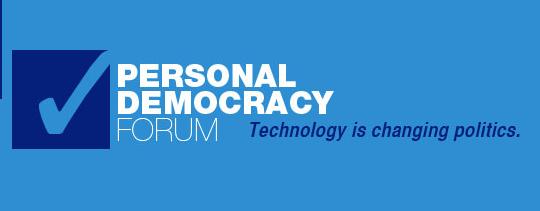Social Media Is The Future of Politics . . . and Independence!

Lessons from Personal Democracy Forum, The "Davos of Technology": While the RIAA and MPAA have been frequent whipping boys in any debate on the failure of Big Media to embrace change in a timely fashion, they are positively visionary standing next to government. But that's changing. Just as media has grappled with, and now leverages, user-generated content (UGC), politics is experiencing its first brush with viewer-generated-activism(VGA).
It's fitting then, to commemorate Independence Day by broadening our focus this week beyond the consumer, to the citizen. They are after all, the same person. Last week's Personal Democracy Forum (PDf) -- touted its organizer TechPresident.com -- was the most mediated conference in all of recorded history. In this one instance, believe the hype.
PDf truly was a spectacle of networked social media. During the two-day event it was ground zero in the Twitterverse; presentations were simultaneously uploaded to Slide Share; sessions were not only filmed for C-Span and uploaded on YouTube, but co-founder Micah Sifry used Qik.com to live-stream video from his cell to the Web. Beyond being blogged, notetaking was enabled (and rewarded, the prize-winning scribe won an iPhone) through Confabb Noteshare, and questions for speakers were posted in real-time through a tool created by Jonathan Zittrain, one of the keynoters. And during the "Mastering the New World of Online Political Video" session, attendees got a first look on Bob Greenwald's latest – a how-to for viral political videos (later that weekend he would be profiled in the New York Times). This all sounds very sexy, but the stories of what these tools support – and can enable -- is the true takeaway here.
Transparency
Perhaps the single-most encouraging panel at PDf, in this era of hyper-partisanship, was Watchdogging Government. It described the building of a "trans-partisan" movement to make government more transparent. The session was chaired by Ellen Miller, founder of the Sunlight Foundation, and bookended ideologically by Mark Tapscott of the Heritage Foundation, who averred that the earlier keynote felt like an Obama rally. But Tapscott was equally quick to tap into shared common ground – that whatever one's ideology, faith in government, or contempt for it, (a la Grover Norquist) accountability is best achieved through transparency. Members of OpenSecrets and FollowtheMoney were singled out by the panel for their groundbreaking contributions to this effort.
Buckling under pressure from this loose coalition, all members of the Senate (but one) have complied with the request to reveal their mortgage-financing information. Next up: a demand that both campaigns unbundle donations, and disclosure of lobbying in real time. Speaking to Saul Hansell of the New York Times' BITS blog, Miller recalled, "I was at a meeting with lobbyists last week and asked how many have BlackBerries. Of course, they all raised their hands. I said they should be reporting on their meetings by sending a text or an e-mail as soon as they walk out of a legislator's office. They all gasped."
Litmus Test for PC Literacy?
A debate surrounding Technological Literacy sparked at PDf and continues to gain momentum. While McCain will never live down saying "the issue of the economy is something I don't understand as I should," PDf attendees were even more shocked by McCain's self-professed computer illiteracy.
While his campaign was keen enough to send a staffer to PDf, online advisor Mark Soohoo's defense of McCain amounted to a limp, "He is aware of the Internet." Why should there be any litmus test? Let us count the ways. How can any presidential candidate otherwise grasp the complex issues surrounding spectrum, copyright, e-commerce/trade, Net Neutrality, while properly sizing up our infrastructure against any threat of cyber-terrorism? What's most astonishing is that McCain sat on the Commerce, Science and Transportation committee for six years! While CNN's Jeanne Moos looked at this from with her trademark whimsy this is an issue that should have standing in the current and future campaigns.
An Uprising In The Obama Ranks?
Not that we're going to let Obama off the hook. A thread among the panels was empowerment through bottom-up democracy. While most presenters were quick to acclaim the Obama campaign for its use of social networking to raises buckets of cash, a few thought leaders including Jonathan Zittrain (The Future of the Internet and How to Stop It) and virtual reality pioneer Mark Pesce were otherwise unconvinced that the campaign itself was truly people-powered. Regarding the Obama campaign he offered this peek into what it might look like once the governance - when pilot goes to series -- begins: "The mob, now mobilized, will do as it pleases. Obama can lead by example, can encourage or scold as occasion warrants, but he can not control."
The test of this proposition isn't waiting until January 21st. In response to Senator Obama's FISA "yes" vote, a "Please Vote No" group formed on MyBarackObama.com last week - demanding that he filibuster with Sens. Dodd and Feingold after the holiday recess. As of this writing the group is the fifth most popular on the campaign Website, with 5,452 members and counting. Will this groundswell pressure Obama to rethink his position? It a first draft for WikiGovernment?
Posting on Jeff Jarvis' BuzzMachine Monday, Joe Trippi, now co-founder of Open Congress (with Creative Commons' Larry Lessig) wrote: "I believe that the next President will stand at the end of the Television Presidency and at the beginning of the Networked Presidency in which the President and the people will connect and work to pass their agenda together, where they can and do agree."
OpenLeft's Matt Stoller went Trippi one better: "[A] good amount of 21st century campaigning will look like the 19th century, with a politicized business community, much stronger local political machines, and engagement levels at 80% or 90%. Local debating societies, nonprofits that do service work and voter turnout, and a blurred line between government and politics are probably in the cards. As social media and public spaces increase in importance in our culture, they will dominate our politics."


